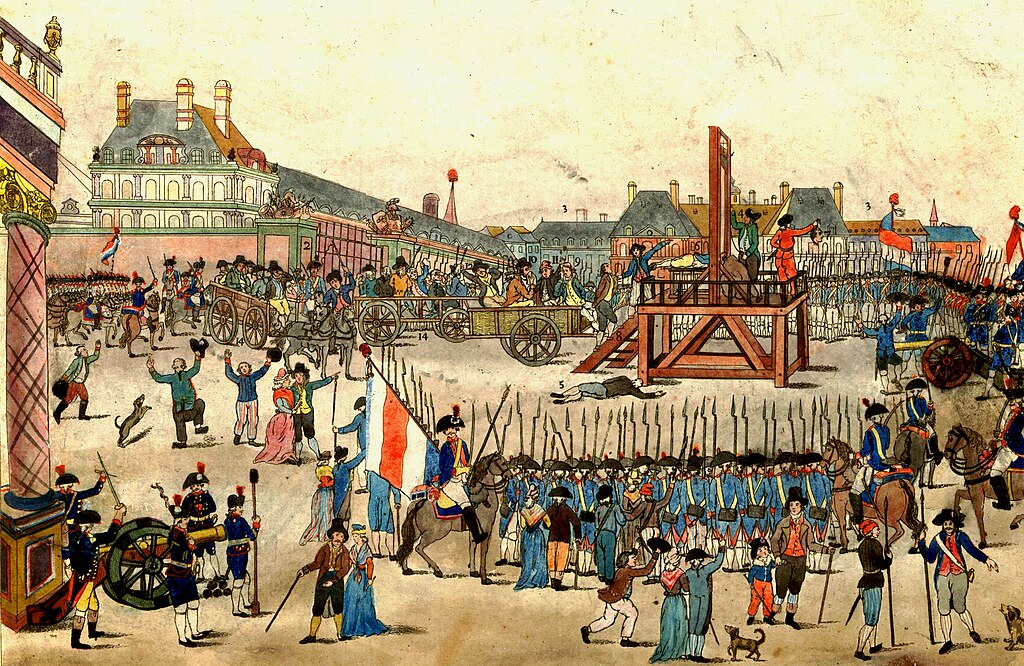
Marie and Antoine Lavoisier (credit: J. L. David, via Wikipedia)
This scientific way of thinking was used
by geniuses like Newton, Harvey, Faraday, Lavoisier, and others. They piled up
successes in the hard market of practical results. Of those who resisted the new
way, some went down in military defeats, some were converted by reason, some
worked out compromises, and some simply got old and died, still resisting the
new ways and still preaching the old ones to smaller and smaller audiences.
The
Enlightenment, as it is now called, had taken over.
Other societies that operated under world
views in which humans were thought to have little ability to control the events
of life are to be found in all countries and all eras of history, but we don’t
need to discuss them all. The point is that the advancing worldview by the late
nineteenth and early twentieth centuries, everywhere on this planet, was the
one we call scientific, also called
the Enlightenment view. Human minds
can solve anything, they believed. Reason will keep producing new waves of
progress. A Golden Age is coming.
The one significant interruption in the
spread of the Enlightenment’s values is the period called the Romantic Age. The
meaning of this time is still being debated. I see it as a period of adjustment, of finding a new balance.
In the cultural evolution of our species, values and ways of life keep evolving
into more vigorous versions of human society all the time. The Romantic Age was
a period of finding a new balance between values that freed individuals
and values that created stability in communities. But, there are a couple of especially
interesting points to note about the Romantic Age (mid-1700s to the mid-1800s).

Art in the Romantic Age (credit: Caspar David Friedrich, via Wikimedia Commons)
First, Romanticism affirmed and
expanded the value of the individual when the Enlightenment had gone too far. Some
prominent Enlightenment thinkers (Kant especially) had made duty—to one’s family,
city , or state—seem like the prime value, the one that should
motivate all humans as they chose their actions. Romanticism asserted passionately that the individual had a greater duty to her/his
own soul. I have dreams, ideas, and feelings that are uniquely mine, and I have
a right to them.
Note also that, paradoxically, this
philosophy of individualism can be very useful for a whole society when it is spread
over millions of citizens and multiple generations. This is because even though
most dreamers create little that is of practical use to the larger community, and
some even become criminals, a few create brilliant things that pay huge
material, political, and artistic dividends. (Steam engines, vaccines, universal
suffrage, Impressionism, etc.)

Drawing of guillotining during the French
Revolution (credit: Wikipedia)
In the second place, however, we should
note that as a political philosophy, Romanticism produced painful excesses. In France,
for example, the citizens were indeed passionate about their ideals of liberty,
equality, and brotherhood, but once they had overthrown the hereditary kings
and nobles and set up their people’s republic, they didn’t know how to
administer a large, populous state. In a short while, they fell into disorder and
internal wrangling. Then, as their new state began to unravel, they simply
traded one autocrat for another (Louis XVI for Napoleon). Their struggle to
understand how a system of government that truly harmonized with the best of human
nature could be created took longer than one generation to evolve.
But the French did begin evolving
resolutely toward it. After Napoleon’s fall, a new Bourbon dynasty got control,
but the powers of the monarchs were now much more limited, and after more turmoil,
the Bourbon gang was ousted altogether. Democracy evolved – in erratic ways and
by pain, but it evolved and grew strong, and is still evolving in France, as is
the case in all modern states.
No comments:
Post a Comment
What are your thoughts now? Comment and I will reply. I promise.